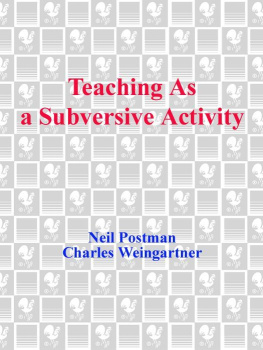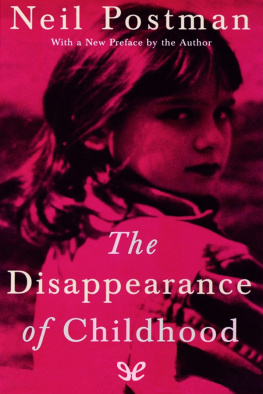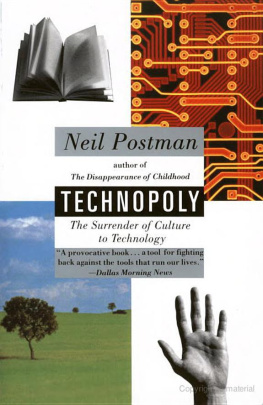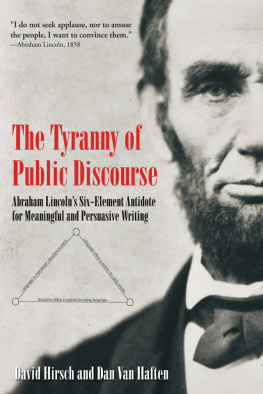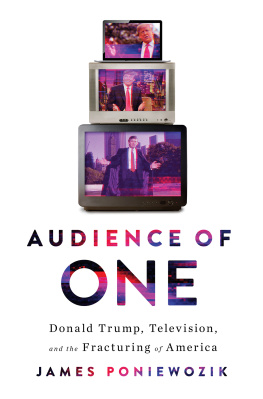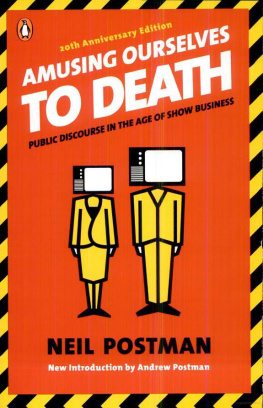Table of Contents
Acclaim for Neil Postmans Amusing Ourselves to Death
As a fervent evangelist of the age of Hollywood, I publicly opposed Neil Postmans dark picture of our media-saturated future. But time has proved Postman right. He accurately foresaw that the young would inherit a frantically all-consuming media culture of glitz, gossip, and greed.
Camille Paglia
A brillant, powerful and important book. This is an indictment that Postman has laid down and, so far as I can see, an irrefutable one.
Jonathan Yardley, The Washington Post Book World
He starts where Marshall McLuhan left off, constructing his arguments with the resources of a scholar and the wit of a raconteur.
The Christian Science Monitor
This comes along at exactly the right moment.... We must confront the challenge of his prophetic vision.
Jonathan Kozol
ABOUT THE AUTHORS
For the last third of the twentieth century, Neil Postman was one of Americas foremost social critics and education and communications theorists, and his ideas and accessibility won him an international following. An influential and revered teacher, he was professor for more than forty years at New York University, where he founded the renowned Media Ecology program. Blessed with an unusually far-reaching mind, he authored more than twenty books, producing major works on education (Teaching as a Subversive Activity, The End of Education), childhood (The Disappearance of Childhood), language (Crazy Talk, Stupid Talk), news (How to Watch TV News, with Steve Powers) and technologys impact on culture (Technopoly). Amusing Ourselves to Death remains his most reverberating and widely read book, translated into more than a dozen languages. He was educated at the State University of New York at Fredonia and Columbia University. He died in October 2003, at the age of seventy-two.
Andrew Postman, Neils son, is the author of five books, including the novel Now I Know Everything. For several years he was a monthly columnist for Glamour and his work has appeared in The New York Times, The Washington Post, and New York Magazine, among numerous publications.

PENGUIN BOOKS
Published by the Penguin Group
Penguin Group (USA) Inc., 375 Hudson Street, New York, New York 10014, U.S.A.
Penguin Group (Canada), 90 Eglinton Avenue East, Suite 700, Toronto, Ontario,
Canada M4P 2Y3 (a division of Pearson Penguin Canada Inc.)
Penguin Books Ltd, 80 Strand, London WC2R ORL, England
Penguin Ireland, 25 St Stephens Green, Dublin 2, Ireland
(a division of Penguin Books Ltd)
Penguin Group (Australia), 250 Camberwell Road, Camberwell, Victoria 3124,
Australia (a division of Pearson Australia Group Pty Ltd)
Penguin Books India Pvt Ltd, 11 Community Centre, Panchsheel Park,
New Delhi - 110 017, India
Penguin Group (NZ), 67 Apollo Drive, Rosedale, North Shore 0632, New Zealand
(a division of Pearson New Zealand Ltd)
Penguin Books (South Africa) (Pty) Ltd, 24 Sturdee Avenue,
Rosebank, Johannesburg 2196, South Africa
Penguin Books Ltd, Registered Offices: 80 Strand, London WC2R ORL, England
First published in the United States of America by Viking Penguin Inc. 1985
Published in Penguin Books 1986
This edition with an introduction by Andrew Postman published 2006
Copyright Neil Postman, 1985
Introduction copyright Andrew Postman, 2005
All rights reserved
Grateful acknowledgment is made to The New York Times Company for permission to reprint from Combining TV, Books, Computers by Edward Fiske, which appeared in the August 7, 1984 issue of The New York Times. Copyright 1984 by The New York Times Company.
A section of this book was supported by a commission from the Annenberg Scholars Program, Annenberg School of Communications, University of Southern California. Specifically, portions of chapters six and seven formed part of a paper delivered at the Scholars Conference, Creating Meaning: Literacies of our Time, February 1984.
eISBN : 978-1-101-04262-5
The scanning, uploading and distribution of this book via the Internet or via any other means without the permission of the publisher is illegal and punishable by law. Please purchase only authorized electronic editions, and do not participate in or encourage electronic piracy of copyrighted materials. Your support of the authors rights is appreciated.
http://us.penguingroup.com
Introduction to the Twentieth Anniversary Edition
Now this?
A book of social commentary published twenty years ago? Youre not busy enough writing e-mails, returning calls, downloading tunes, playing games (online, PlayStation, Game Boy), checking out Web sites, sending text messages, IMing, Tivoing, watching what youve Tivoed, browsing through magazines and newspapers, reading new booksnow youve got to stop and read a book that first appeared in the last century, not to mention the last millennium? Come on. Like your outlook on today could seriously be rocked by this plain-spoken provocation about The World of 1985, a world yet to be infiltrated by the Internet, cell phones, PDAs, cable channels by the hundreds, DVDs, call-waiting, caller ID, blogs, flat-screens, HDTV, and iPods? Is it really plausible that this slim volume, with its once-urgent premonitions about the nuanced and deep-seated perils of television, could feel timely today, the Age of Computers ? Is it really plausible that this book about how TV is turning all public life (education, religion, politics, journalism) into entertainment; how the image is undermining other forms of communication, particularly the written word; and how our bottomless appetite for TV will make content so abundantly available, context be damned, that well be overwhelmed by information glut until what is truly meaningful is lost and we no longer care what weve lost as long as were being amused.... Can such a book possibly have relevance to you and The World of 2006 and beyond?
I think youve answered your own question.
I, too, think the answer is yes, but as Neil Postmans son, Im biased. Where are we to find objective corroboration that reading Amusing Ourselves to Death in 2006, in a society that worships TV and technology as ours does, is nearly an act of defiance, one of those I-didnt-realize-it-was-dark-until-someone-flipped-the-switch encounters with an illuminating intellect? Lets not take the word of those who studied under my father at New York University, many of whom have gone on to teach in their own college (and occasionally high school) courses what he argues in these pages. These fine minds are, as my fathers was, of a bygone era, a different media environment, and their biases may make them, as they made him, hostage of another time, perhaps incapable of seeing the present world as it is rather than as theyd like it to be. (One mans R rating is anothers PG-13.) And just to make a clean slate of it, lets not rely, either, on the opinions of the numerous readers of the original edition of Amusing Ourselves to Death (translated into a dozen languages, including German, Indonesian, Turkish, Danish and, most recently, Chinese), so many of whom wrote to my father, or buttonholed him at public speaking events, to tell him how dead-on his argument was. Their support, while genuine, was expressed over the last two decades, so some of it might be outdated. Well disregard the views of these teachers and students, businesspeople and artists, conservatives and liberals, atheists and churchgoers, and all those parents. (Well also disregard Roger Waters, cofounder of the legendary band Pink Floyd, whose solo album,


